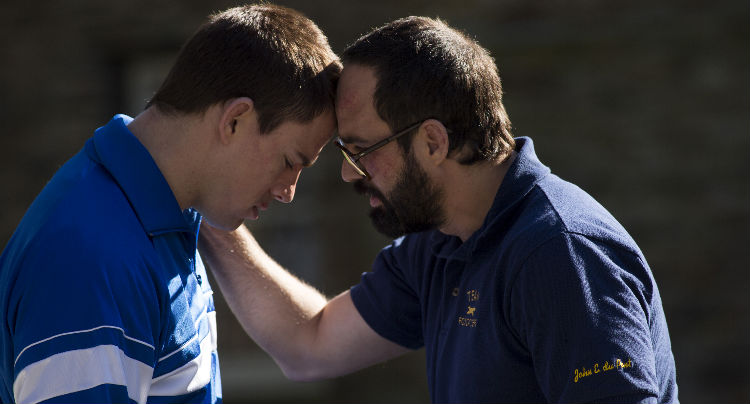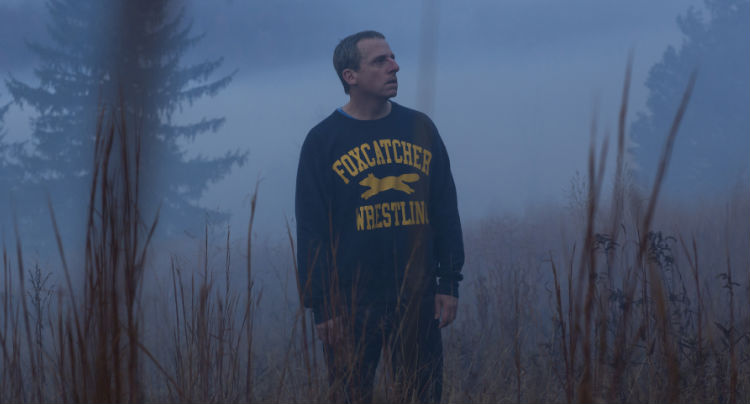Bennett Miller On Foxcatcher: It’s Designed to Desensitize You

Following Capote and Moneyball, Foxcatcher continues Bennett Miller’s streak of narrative films based on true events. In 1996, Olympic wrestler and gold medal winner Dave Schultz was murdered by John Du Pont, the heir to a bottomless family fortune who sponsored Schultz and his brother Mark, also a wrestler and gold medalist. Miller accentuates the uneasy psychology behind the events that led to the bloodshed, with Channing Tatum, Mark Ruffalo, and Steve Carrell turning in eerie, lived-in performances that deserve all the Oscar talk that’s been steadily brewing since the film premiered at Cannes.
In a sit-down interview I spoke with Miller about the film’s eerie sound design; Ruffalo’s past life as a wrestling champion; Tatum and Ruffalo’s chemistry; words and plot being dispensable; John Du Pont’s greatest fear; how he doesn’t like to watch his own films; and more.

The sound in the movie–or sometimes, lack thereof–is very evocative and eerie.
The style of the film is designed to desensitize you [so that you notice] all sorts of subtleties that are occurring beneath the surface in these performances. Part of that is silence. Silence has a way of magnifying and amplifying, sensitizing us. It’s also a very difficult thing to face because we like to feel the silences in an attempt to masquerade against something that we are uncomfortable with. Within this film, for example, there are moments where the silence just exposes and shines a light on something that might not be comfortable to look at.
The physical transformations for all three of your leads were pretty incredible. Watching trailers and TV spots leading up to the film, I was expecting Steve and Channing’s physical appearance to be altered, but Mark is outstanding as well. As someone semi-familiar with what wrestlers’ body types and how they move, I thought he looked spot-on. Was he in that kind of shape before he took on the role?
No. I don’t want to say he was out of shape, but he wasn’t in anything like the shape he got into. He had been a wrestler in high school. He was a state champion, as was his father. As much as he understood about the sport, he still had to relearn, because he wanted to emulate the way Dave Schultz did specifically. Not only the style, but the fact that he’s a lefty. He had to learn how to lead left.
Cung Le, a mixed martial artist who worked with Channing on a movie called Fighting, said that if Channing wanted to, he could have easily become a great fighter. Talk about what it was like to watch Mark and Channing go to work after all of their training and preparation. That early scene of them training together looks super authentic.
These guys worked at it for so long. What happened was that they not only became convincing when it came time to execute the wrestling scenes, but there was something that emerged between the two of them as wrestling partners that is expressive of the culture and of their relationship. When I assembled that particular scene in the edit and looked at it, I was really struck by how much we understood about who they were and who they were to each other. So much was expressed in that regard that I was able to eliminate about 20 minutes of scenes that had been designed to communicate who these guys were to each other. That’s just what happens when you’ve got great actors who prepare properly.
So that sparring scene wasn’t designed to express their relationship that much?
A little bit. You see the revelry, the rivalry, the affection. You see the alpha and the beta. You see the respect. There’s also the intangible, the feeling of who they are to each other. It was so clear that it made so much of what we had already shot redundant.
I recently talked to Damien Chazelle, the director of Whiplash, a fantastic film. He was telling me about how he viewed narrative and plot as an excuse to get to cinematic moments like the one we were just talking about, in which we gather information visually and sonically, without dialogue. Do you share his viewpoint?
Totally. Absolutely. My first film is a documentary called The Cruise. It’s a portrait of a semi-homeless tour guide who gives tours on double-decker buses. I restrained from including any kind of biographical, narrative information in the entire movie. It’s only those [cinematic] moments. The challenge became about sequencing the moments I got while shooting, these incredibly expressive moments that did not have the benefit of that narrative context. It’s more easy to get away with that in something that’s a “documentary”, but it taught me how dispensable words and plot can be. You can create an arc that gives real structure and sustain a dynamic that delivers without all the things we traditionally have come to believe are requirements.
The answer [to your question] is yes. As further evidence of that, the amount that I eliminated in the edit and the reordering of things was much more considerate of the quality and energy of these moments and what was expressed inadvertently and wordlessly. It was to the point where things that might have once been thought as fixed, narratively, in this particular order, we realized, “Well, the quality and feeling of this moment would be nicer if it came later.” We were really able to blow up the structure in the edit to give priority to how moments communicated outside of the narrative.
Would it be fair to say this story is about ego?
Say more. Tell me what you mean.
I feel that Mark and John are driven by their bruised egos, this insatiable need for validation.
Ego is just another word for self. I think both of these characters are struggling with concepts of themselves and how they conflict with the reality of themselves. John Du Pont cast himself in a role, a concept for self, that his real self could not live up to. That is a tragic act. The fundamental ingredient to all tragedy is deceit, and that’s a form of self-deception based on ego. Based on self. I think that Mark Schultz possessed a similar flaw.

What would you guess John Du Pont’s greatest fear was?
I would guess that his greatest fear was powerlessness.
Does watching your films multiple times reveal new things to you?
I watched it once with an audience. Once it’s done, it’s done. It’s very difficult for me to go back and look at a film again once it’s been completed.
I assume you deride your joy from the process of filmmaking and not necessarily the fruits of your labor.
For sure. The process and the collaborations. It’s great working with a community of people who share a common goal, commitment and determination. When you’re all working on the same movie–which often is not the case–it’s very satisfying.
